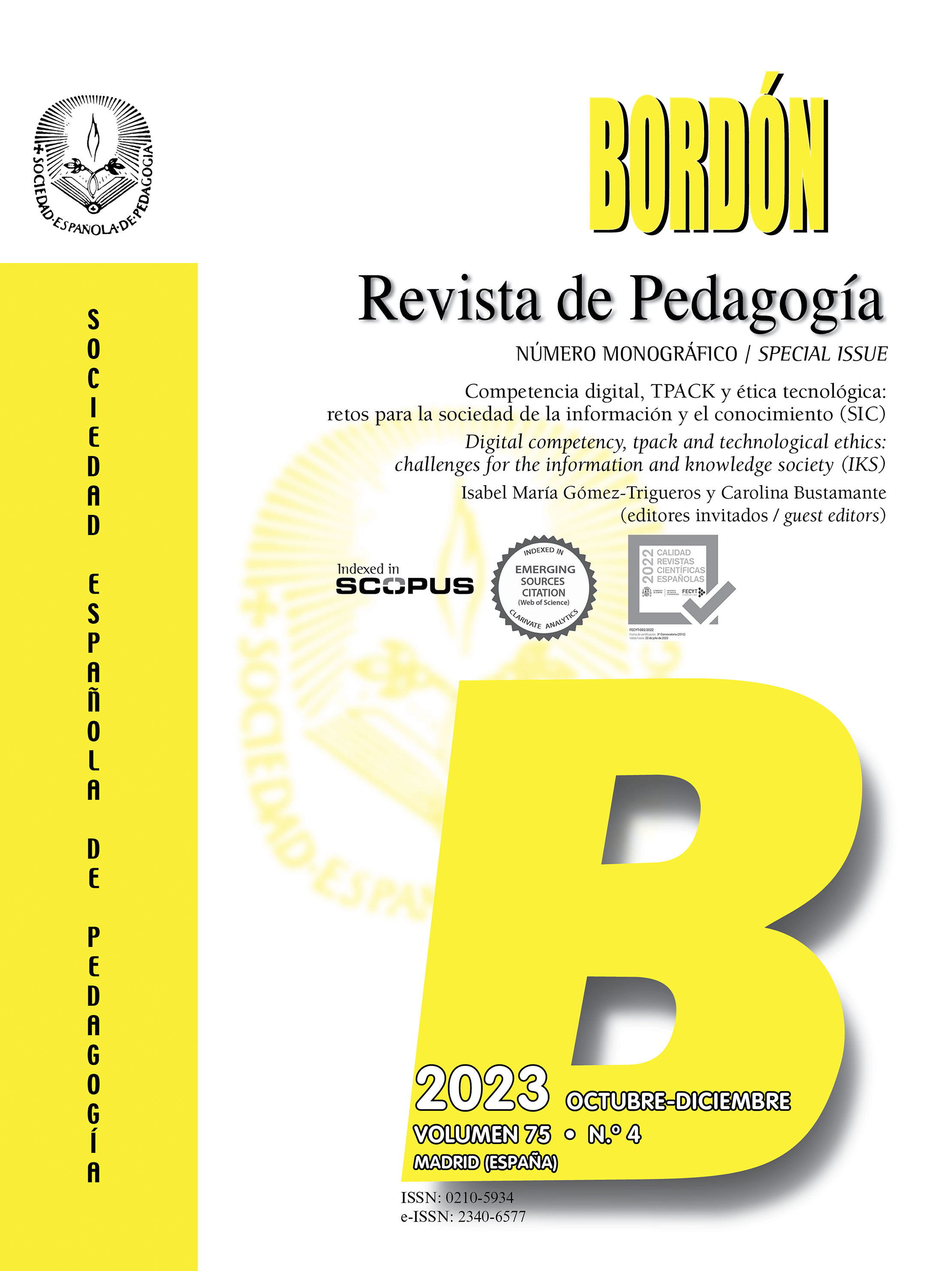New perspectives on teacher preparation in digital competencies
Main Article Content
Abstract
INTRODUCTION. Changes in the Information and Knowledge Society also involve changes in teacher preparation. Teacher digital training is one of the most important challenges in education in the 21st century. In this context, it is a must to reflect upon active and participatory approaches that lead to an adequate implementation of technology in the classroom. New technologybased teaching and learning models have emerged, focusing on several points: How these tools adapt to educational contexts; which ethical perspectives are used to digitally train future teachers; or how these requirements are tackled in the classroom. METHOD. Different lines of analysis are presented related to technology-based teaching and learning, such as Technological Pedagogical Content Knowledge; approaches to learning communities using Small Private Online Courses and the Technology Acceptance Model; gender digital gap through analysis of robotics use in STEM classes; or specific experiences related to the use of Learning and Knowledge Technologies and the need for training in digital competencies. RESULTS. Studies related to teachers’ digital competencies and how they are reflected in instructional methods are identified, as means to the development and adaptation of education to the current society’s new requirements for digital skills. The need for new educational proposals in classrooms that approach the reality of a world mediated by technology is envisioned. DISCUSSION. An adequate use of technology in the classroom is proposed, supported by the variety of articles in this volume with diverse recommendations on the topic.
Downloads
Article Details

This work is licensed under a Creative Commons Attribution-NonCommercial 4.0 International License.
References
Aiken, R. M. y Epstein, R. G. (2000). Ethical guidelines for AI in education: Starting a conversation. International Journal of Artificial Intelligence in Education, 11, 163-176. https://bit.ly/3ryzUaa
Bustamante, C. (2017). TPACK and teachers of Spanish: Development of a theory-based joint display in a mixed methods research case study. Journal of Mixed Methods Research, 13(2), 163-178. https://doi.org/10.1177/1558689817712119
Bustamante, C. (2019). TPACK-based professional development on Web 2.0 for teachers of Spanish: A case study. Computer Assisted Language Learning. https://doi.org/10.1080/09588221.2018.1564333
Bustamante, C. (2023). Beyond the joint display in mixed methods convergent designs: A caseoriented merged analysis. In C. Poth (ed.), The SAGE Handbook of Mixed Methods Research. SAGE.
Bustamante, C. y Moeller, A. (2013). The convergence of content, pedagogy, and technology in online professional development for teachers of German. CALICO Journal, 30(1), 82-104.
Cabero-Almenara, J., Barroso-Osuna, J., Llorente-Cejudo, C. y Palacios-Rodríguez, A. (2022). Validación del Marco Europeo de Competencia Digital Docente mediante ecuaciones estructurales. Revista Mexicana de Investigación Educativa, 27(92), 185-208. http://www.scielo.org.mx/scielo.php?script=sci_arttext&pid=S1405-66662022000100185&lng=es&tlng=es
Cusanelli, L. N. y Trevallion, D. (2020). Using technology for productive, creative purpose. International Journal of Innovation, Creativity and Change, 13(1), 1-12.
Doucet, A., Netolicky, D., Timmers, K. y Tuscano, F. J. (2020). Thinking about pedagogy in an unfolding pandemic: And independent report on approaches to distance learning during COVID19 school closures. https://issuu.com/educationinternational/docs/2020_research_covid-19_eng
Febriani, S. R. y Anasruddin, A. (2020). Technology for Four Skills Arabic in the Era Emergency of Covid-19 in Indonesia. Ta’lim Al-’Arabiyyah: Jurnal Pendidikan Bahasa Arab & Kebahasaaraban, 4(1), 1-11. https://doi.org/10.15575/jpba.v4i1.8221
Garrison, D. R. y Anderson, T. (2005). El elearning en el siglo XXI: investigación y práctica. Octaedro.
Gómez-Trigueros, I. M. (2023). Digital skills and ethical knowledge of teachers with TPACK in higher education. Contemporary Educational Technology, 15(2), ep406. https://doi.org/10.30935/cedtech/12874
Gómez-Trigueros, I. M., Ortega-Sánchez, D. y García, R. (2021). Brecha digital de género y coeducación: claves conceptuales y orientaciones metodológicas. McGraw-Hill Interamericana de España (colección Aula Magna).
Gómez-Trigueros I. M., Ruiz-Bañuls, M. y Ortega-Sánchez, D. (2019). Digital Literacy of Teachers in Training: Moving from ICTs (Information and Communication Technologies) to LKTs (Learning and Knowledge Technologies). Education Sciences, 9(4), 274. https://doi.org/10.3390/educsci9040274
Gómez-Trigueros, I. M. y Yáñez, C. (2021). The Digital Gender Gap in Teacher Education: The TPACK Framework for the 21st Century. European Journal of Investigation in Health, Psychology and Education, 11(4), 1333-1349. https://doi.org/10.3390/ejihpe11040097
Higueras, E. (2013). En la senda de la escuela 2.0: de cómo invisibilizar las tecnologías a cómo construir propuestas educativas para el siglo XXI (Tesis Doctoral, Universidad de Barcelona). http://www.tdx.cat/bitstream/handle/10803/131998/EHA_TESIS.pdf;jsessionid=3819AB5767F076CFC5E69DD3CD763926.tdx1?sequence=1
INTEF (2017). Marco Común de Competencia Digital Docente 2017. Madrid: MECD. http://www.educalab.es/documents/10180/12809/Marco+competencia+digital+docente+2017/afb07987-1ad6-4b2d-bdc8-58e9faeeccea
Jordan, K. (2021). Revisiting TPACK and gender research. En Isabel María Gómez-Trigueros, Delfín Ortega-Sánchez y Rudy García (eds.), Brecha digital de género y coeducación: claves conceptuales y orientaciones metodológicas (pp. 63-81). McGraw-Hill Interamericana de España (colección Aula Magna).
Mâță, L., Clipa, O. y Tzafilkou, K. (2020). The development and validation of a scale to measure university teachers’ attitude towards ethical use of information technology for a sustainable education. Sustainability, 12(15), 6268. https://doi.org/10.3390/su12156268
Medina, H., Lagunes, A. y Torres, C. (2017). ITL Logic Model: Origen, desarrollo y aplicación del modelo. En I. Esquivel (coord.), Los Modelos Tecno-Educativos, revolucionando el aprendizaje del siglo XXI (pp. 161-174). DSAE.
Mishra, P. y Koehler, M. (2006). Technological pedagogical content knowledge: A framework for integrating technology in teacher knowledge. Teachers College Record, 108(6), pp. 1017-1054. https://doi.org/10.1111/j.1467-9620.2006.00684.x
OECD (2021). OECD Science, Technology and Innovation Outlook 2021: Times of Crisis and Opportunity, OECD Publishing. https://doi.org/10.1787/75f79015-en
ONU (2017). Informe de los Objetivos de Desarrollo Sostenibles 2017. Naciones Unidas. https://www.unstats.un.org/sdgs/files/report/2017/thesustainabledevelopmentgoalsreport2017_spanish.pdf
Ordóñez, M. (2014). Desarrollo de una propuesta de intervención educativa para el fortalecimiento del uso de las TIC como herramienta de enseñanza y aprendizaje en las Instituciones Educativas. En E. Said (…) y B. Velasco (2014). Acta VII Simposio Las Sociedades ante el Reto Digital (pp. 20-258). RedYika.
Shulman, L. S. (1986). Those who understand: Knowledge growth in teaching. Educational researcher,15(2), 4-14.
UNESCO (2017). Comunicado de Qingdao. Educación 2030. https://www.unesdoc.unesco.org/ark:/48223/pf0000253061
World Economic Forum (2020). Schools of the Future: Defining New Models of Education for the Fourth Industrial Revolution. https://www3.weforum.org/docs/WEF_Catalysing_Education_4.0_2022.pdf
Yáñez, C. y Gómez-Trigueros, I. M. (2022). Challenges with Complex Situations in the Teaching and Learning of Social Sciences in Initial Teacher Education. Social Sciences, 11(7), 295. https://doi.org/10.3390/socsci11070295

